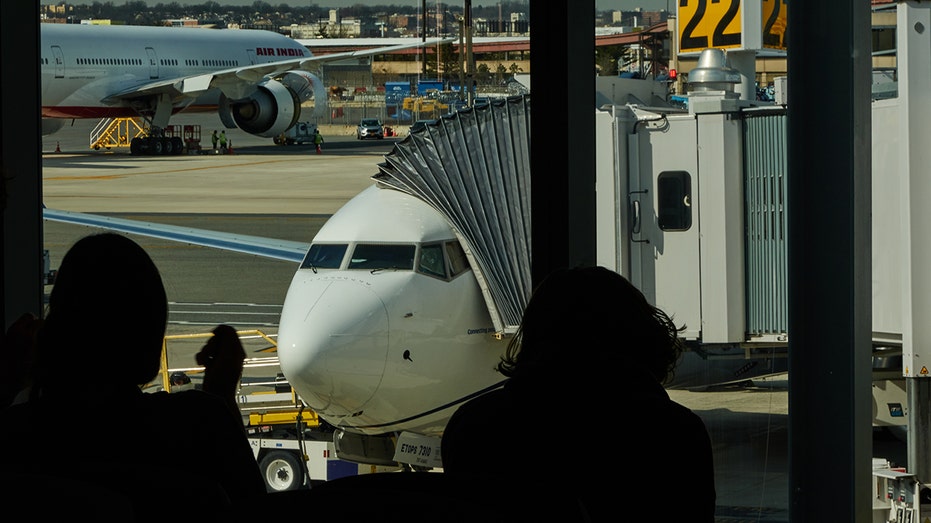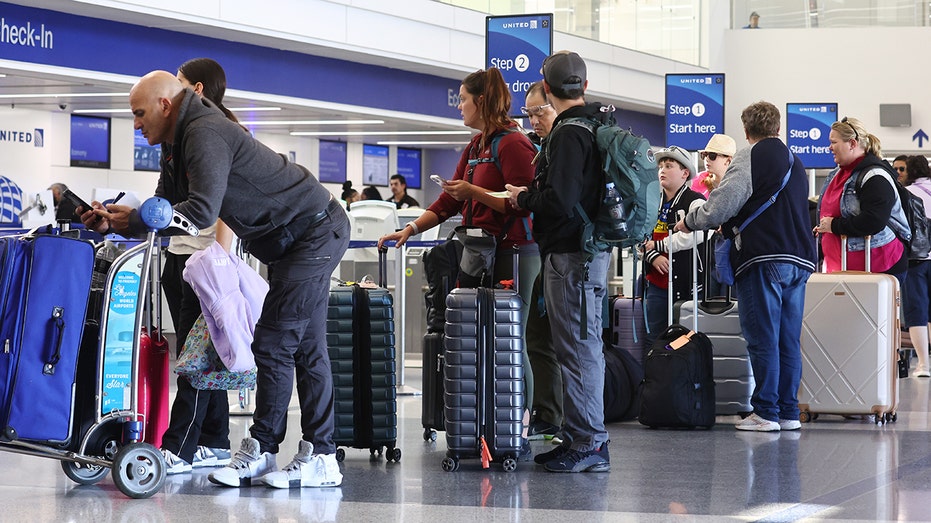US vacationers are pulling back

Priceline CEO Brett Keller breaks down leisure spending in the United States on ‘The Claman Countdown.’
The travel industry is warning that U.S. consumers are pulling back on their excursions.
“The desire to travel is ingrained in humans, but financially there are signs that the consumer might not be able to endure the amount of travel they would like,” Morningstar equity analyst Dan Wasiolek told FOX Business.
Earlier this month, Hilton CEO Chris Nassetta told analysts during an earnings call that the money consumers saved up during the COVID-19 pandemic had been depleted.
“They’ve spent all that money. They’re now borrowing more. And so, they have less available, less disposable income and capacity to do anything, including travel,” Nassetta said. However, this isn’t a problem with the “upper echelons” of its customer base, he noted.
THEME PARK REVENUES TAKE A DIVE AS INFLATION, HIGH COSTS BITE
Travelers wheel luggage toward a Spirit Airlines check-in desk at George Bush Intercontinental Airport, on Nov. 21, 2023, in Houston. (Jason Fochtman/Houston Chronicle via Getty Images / Getty Images)
Similarly, Priceline CEO Brett Keller warned that there has been a softness in leisure travel. Priceline was just one of a growing list of travel companies, including Airbnb, Expedia and Marriott, that used the term “softness” more than they have in the past.
“I wouldn’t call it a slowdown but certainly a little bit of softness here and there,” Keller told FOX Business’ Liz Claman. “I think the consumer is really reaching a point now where they are making some very conscious decisions about how they want to spend their money.“
DELTA ESTIMATES CROWDSTRIKE OUTAGE COST AIRLINE $380M IN REVENUE
Airbnb also told analysts earlier this month that it anticipates “sequential moderation” of growth in bookings year over year during the third quarter.
In its shareholder letter, Airbnb said it’s “seeing shorter booking lead times globally and some signs of slowing demand from U.S. guests.”
Demand for Airbnb, though, is still well above 2019’s levels and near all-time highs, according to Wasiolek.

Travelers wait to board a Boeing 737 Max 8 plane operated by United Airlines at Newark Liberty International Airport in Newark, New Jersey, on March 13, 2024. ( Bing Guan/Bloomberg via Getty Images / Getty Images)
Overall, U.S. leisure travel and domestic travel in China are the two areas where Wasiolek is noticing the softest demand.
Wasiolek pointed to how U.S. consumer savings as a percent of disposal income was 3.4% in June, down from 4.4% in July 2023 and from the average of 5.2% between 2010 and 2019.

Travelers stand at a United Airlines check-in area at Los Angeles International Airport on Jan. 8, 2024, in Los Angeles, California. ( (Photo by Mario Tama/Getty Images))
“Lower-price hotel operators, like Wyndham and Choice, are seeing the weakest growth, as they tend to service more leisure than business and group travel,” Wasiolek said, citing how Wyndham’s revenue per available room fell 2% in the second quarter.
GET FOX BUSINESS ON THE GO BY CLICKING HERE
S&P Global reported that lower-end consumers have “become more price sensitive due to a decline in savings, high hotel rates, and a cooling labor market.”
It said in its recent report that “further softening of the economy could lead higher-income travelers to tighten their travel budgets or search for deals, which could pressure room rates.”
Related
Turkish Airlines and Qatar Airways Suspend Mogadishu Flights Following US…
Home » Airlines News of Qatar » Turkish Airlines and Qatar Airways Suspend Mogadishu Flights Following US Embassy Terror Alert, Raising Security Concerns at
Local tourism destinations grow fast
Men sit at the Doha Corniche backdropped by high buildings in Doha on March 3, 2025. Photo by KARIM JAAFAR / AFP DOHA: Local tourism destinations are g
Hajj, Umrah service: Qatar Airways introduces off-airport check-in for pilgrims
Image credit: Supplied Qatar Airways has introduced an off-airport check-in
IAG, Qatar Airways, Riyadh Air, Turkish Airlines, Lufthansa & more…
Turkish Airlines – a Corporate Partner of the FTE Digital, Innovation & Startup Hub – is charting a course to rank among the top 3 global airlines for












